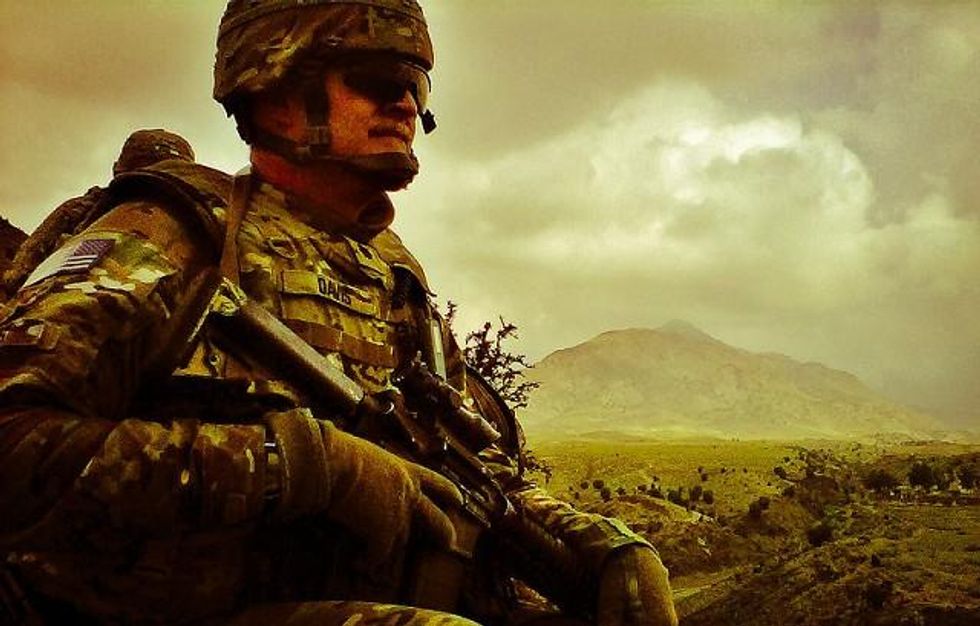When Lt. Col. Daniel L. Davis returned from his second tour in Afghanistan, he knew that what he'd witnessed firsthand didn't match the rosy progress reports that top military officials were giving Congress.
What Davis decided to do next could be called courageous or, perhaps, idealistic. The 17-year Army veteran put his career at risk by speaking out for what he felt was right -- he publicly called out his superior officers on their assessments of the war.
Specifically, Davis alleged that top commanders had misled Congress and the public. He briefed four members of Congress on his version of events and sent reports he authored, one unclassified and the other classified, to the Department of Defense Inspector General.
Then, he took the extraordinary step of bringing his story to light: He did an interview with The New York Times and authored an op-ed for the Armed Forces Journal. His unclassified report was linked to by both Rolling Stone and the Times. With all of this national coverage of Davis' report, which alleged that senior military officials have lied to Congress about conditions on the ground, you would think that Congress would be jumping at the opportunity to hold hearings. At least six members of Congress have come forward publicly supporting Davis, but no hearings have been scheduled.
It's incredible that Congress has virtually ignored Davis' allegations that it's been misled. You might expect that the Foreign Affairs, Armed Services, or Intelligence Committees would jump at the chance to hold hearings on Afghanistan and ask Davis to testify. But you'd be wrong.
Why should we listen to Davis? He's a soft-spoken, unassuming soldier who was described in one evaluation as someone whose "devotion to mission accomplishment is unmatched by his peers." Davis also made the point that he is no "WikiLeaks guy part II"-- he's made a concerted effort to protect classified information.
"Entering this [most recent] deployment, I was sincerely hoping to learn that the claims were true: that conditions in Afghanistan were improving, that the local government and military were progressing towards self-sufficiency," Davis wrote in his op-ed. "Instead, I witnessed the absence of success on every level."
In Davis' 84-page unclassified report, he outlined the misconduct he perceived among senior officials in Afghanistan after interviewing a reported 250 soldiers -- from low-ranking 19-year-old privates to division commanders. He alleged that the March 2011 congressional testimony by Gen. David Petraeus on the surge in Afghanistan ranged from "misleading" to "completely inaccurate." Petraeus is now the director of the Central Intelligence Agency.
Additionally, according to Davis, the "inaccurate assigning of the reason for the 2007 Iraq surge's success had profound implications for our current war in Afghanistan and doubly so for the surge forces ordered by the President in late 2009." One senior ground commander who led much of the U.S. fight in Anbar province told Davis that "75 to 80 percent of the credit" for the success in Iraq's surge lay elsewhere.
A bipartisan group of representatives sent a letter on Feb. 14 urging House Speaker John Boehner (R-OH) and House Minority Leader Nancy Pelosi (D-CA) to hold hearings on Davis' allegations because they are supported by the 2011 National Intelligence Estimate (NIE) on Afghanistan. The 2011 NIE has not yet been declassified, but two members of Congress sent a letter to President Obama in February asking that he declassify it.
According to The New Yorker, which also called for the document's declassification: "[The NIE] is said to raise doubts about the authenticity and durability of the gains the military commanders believe they have made since Obama's troop surge began in 2009. The findings also raise questions about the Administration's strategy for leaving behind a stable Afghanistan."
The lawmakers' letter is on target. If taxpayers are to get a full picture of what's happening on the ground, Obama needs to declassify the National Intelligence Estimate. Additionally, whistleblowers like Davis shouldn't be dismissed once the media fanfare has died down. His allegations should be seriously considered in congressional hearings. With the cost of the Afghanistan War climbing far past the Obama administration's estimate, the public deserves to hear the truth, the whole truth, and nothing but.




